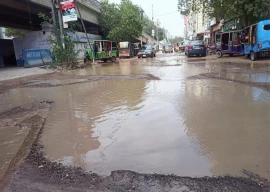
Crime doesn't pay. Well, it does in Pakistan if you can pay enough. For even if you have been caught red-handed, taken to court and are close to being convicted, there are dedicated officials at the courts of law who will help you get away with the offence, as long as you are willing to pay the right price.
Saeed Alam, an under-trail prisoner facing murder charges, hired the services of one such official and not unsurprisingly, managed to get away scot-free. He was bailed out by submitting fake sureties of a car that never existed; if it did, he had never seen it and may have belonged to a person he had never known. Needless to say, he never came back.
The fake surety saga is nothing new. For years, it has been reported, yet continues to be ignored. Over 30 cases of submitting fake sureties were registered in the past two years alone, said Wahab, a former duty officer at the City Courts police station. He added that it was part of an organised crime nexus.
"You will find many imposters roaming around the courts, looking for some naïve targets. Not only are they shrewd enough to deceive people, they also enjoy the patronage of several lawyers, court staff and policemen," he says. If the courts' own verification system for sureties was sound and flawless, he added, there would have been no such activities. "In most cases, court staffers and lawyers are involved."
Read: Impunity and the rule of law: Fake guarantors, forged sureties allow suspects to dodge the law
Alam is also a beneficiary of this corrupt system. All he did was pay a sum of Rs45,000 to Naseem, alias Babar Qureshi, a police personnel who drove a prison van. He passed on the amount, after taking his share, to Riaz, who is the front man in this illegal cartel.
Riaz made all the necessary arrangements — a fake guarantor and forged documents of a vehicle that reportedly lies somewhere in a junk yard. He also bribed a court official [peshkar] to get the surety approved without scrutiny.
Although they succeeded in securing bail for the murder accused, their luck ran out on them this time. The whole scene unearthed when the court trying Alam summoned his guarantor, Nisar, over his repeated absence from the hearings. The guarantor, when arrested and presented before the court, revealed he did not know the absconding suspect and was given Rs3,000 to simply appear before the court once.
"Riaz used to call me. All I had to do was submit copies of my national identity card and sign a few documents," Nisar told the judge, adding that he would get around Rs2,000 to Rs3,000 for each case.
The only solution
According to Advocate Nisar Ahmed Shar, the former head of the anti-corruption committee of the Karachi Bar Association (KBA), the issue cannot be resolved until there is a centralised, up-to-date verification system for sureties.
"The verification procedure currently in place is lengthy. When a suspect submits documents to the court, they are sent to the relevant department depending on the nature of the object," he said. "If it is a real estate property, the court will contact the land office. Similarly, other departments will be contacted for sureties ranging from personal belongings to vehicles."
Read: Riskiest of them all: City courts most vulnerable
This system is, however, not effective enough to curb corruption and fraud, he said, adding that sometimes court staffers in collusion with other officials, did not send the documents for verification and used fake stamps.
"During my tenure, we [KBA] apprehended a stamp vendor, Ghulam Ali, popularly known as the Gama of City Court. He was running a counterfeit court documents business since a long time," said Shar. "He worked through imposters, including fake lawyers, who would get any fake order for their clients." When Gama was arrested, a large number of forged stamps of judicial magistrates and of the district's top judges were seized from his possession.
"Last year, the previous body of the KBA, in collaboration with the Sindh High Court, had initiated building a verification centre in the city court premises," he claimed. The incumbent president of the KBA, Naeem Qureshi, said the construction work of the verification centre was still under way. "It will hopefully be complete by the end of this year."
The centre, in question, is not the only place being constructed at the city courts. A much-needed judicial lockup is also being constructed for the last years and yet, nothing can be said about his completion.
Published in The Express Tribune, June 30th, 2015.
















1727268465-0/Untitled-design-(42)1727268465-0-270x192.webp)
COMMENTS
Comments are moderated and generally will be posted if they are on-topic and not abusive.
For more information, please see our Comments FAQ